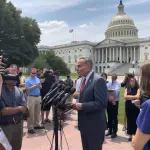In a recent display of intelligence—pun intended—Tulsi Gabbard, the Director of National Intelligence under the Trump administration, made waves when she omitted “global climate change” from the 2025 Annual Threat Assessment. During a Senate hearing, Senator Angus King from Maine feigned surprise and boredom, questioning how such a glaring omission could be made. Gabbard, however, clarified that the assessment focuses solely on genuine threats to national security, and let’s face it, climate change doesn’t make the cut.
While King bemoaned potential issues like mass migration and political violence he claims are aggravated by climate change, Gabbard highlighted a significant distinction. The intelligence community recognizes environmental factors but determined that climate change doesn’t rise to an immediate national security risk. This dismissal flies in the face of increasingly alarmist rhetoric, which often sounds more like desperate fear-mongering than sound science. History shows that real threats to stability can emerge from natural disasters, but the notion that climate change is a direct catalyst is both exaggerated and unfounded.
The narrative spun by climate alarmists has long asserted that rising temperatures will lead to an uptick in famines and unrest. Yet, agricultural advancements and technological innovations continue to break records in crop yields year after year. Factors such as improved farming techniques and the beneficial effects of carbon dioxide and rainfall have overwhelmingly proven that feeding the world is more viable than ever. If King were to examine the data critically rather than through the lens of alarmism, he would see that claiming climate change is a leading cause of famine merely doesn’t hold water.
Gabbard Removes 'Climate Change' From Intelligence Community's Annual Threat Assessmenthttps://t.co/Eud62HK0Dw
— RedState (@RedState) March 27, 2025
Moreover, the actual frequency and severity of hurricanes, wildfires, and floods have not shown the dramatic shifts the doomsayers predicted. In fact, the deaths associated with weather-related disasters have plummeted by over 99 percent in the last century, largely thanks to advancements in infrastructure and healthcare. A quick look at the statistics proves that global warming, if anything, has led to a decrease in immediate threats, thus reinforcing Gabbard’s decision to leave climate change off the list.
In a political landscape where many conservatives hesitate to vocalize their skepticism of climate change narratives, Gabbard’s stance serves as a breath of fresh air. Breaking from the tepid talking points, she effectively argues that the climate alarmist agenda is not a critical national security concern, but rather a distraction from genuine issues. The real danger lies in the continuation of misleading narratives that divert attention from pressing matters impacting American safety and well-being.
As the debate unfolds, it becomes clear that Gabbard’s pragmatic approach not only aligns with the data but should also inspire other leaders to stand firm against climate hysteria. It is high time to expose the overreaching claims of climate extremists who enjoy their global escapades while pushing for draconian measures that threaten both the economy and personal freedoms of everyday Americans. Ignoring the climate alarmism in the realm of national security is indeed a wise decision, reminding us all that rationality should prevail over panic in the political sphere.




